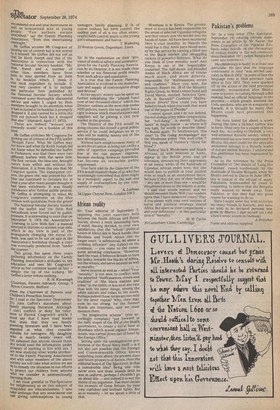African reality
Sir: Your editorial of September 7, Opposing the joint exercises held between the South African and Royal Navies, shows a most interesting turn of mind. Having decided, to your own satisfaction, that the "whole" political future of Africa lies in black hands, that Rhodesia and South Africa can no longer exert "a substantial, let alone a civilising influence" (my italics) on the continent; — you come to the consequent arresting conclusion: "However hard the road, it behoves Britain to turn her policy towards the blacks of Africa, not the whites, and serve interest as well as morality." Serve interest as well as —what? Your "morality" is not seen to conflict with the admitted "malfeasances, errors and crudities" of "the black nations and tribes" to the north; or less so at any rate than with the same things, among the white nations and tribes to the south. Perhaps indeed those terms are too mild for the latter region? Why, they may even be too strong, for the former! Words are important, and ' we must measure them.
"An imaginative scheme" (you accordingly complain) "put forward in the early stages of the life of the Heath government, to create a naval base at Mombasa which would replace Simonstown, was turned down out of hand by the Foreign Office."
Setting aside the unimaginative preferences of the Royal Navy itself — is it not also just possible that the Foreign and Commonwealth Office knows something more about the present state and future prospects of Kenya, than the editorial board of The Spectator. Is that a conceivable idea? Being one who never even saw these islands until he was in uniform, perhaps I shouldn't go on about this — and indeed it is not the theme of my argument. You must decide 'the interests of Great Britain, by your own confident and brilliant lights. But as to morality — let me speak a little of that.
Mombasa is in Kenya. The government of Kenya has been responsible for the arrest of selected Ugandan refugees, and their return over the border into the hands of Amin. All have been murdered. Here is your morality. In Nairobi the word has it that Amin pays blood-money for this service by turning a blind eye to the black market and smuggling rackets of powerful Kenyans. What do you think of your morality now? And Kenya is one of the 'respectable' countries! The half-dozen full-blooded Amins of black Africa are of course much more, and more directly, responsible, for "malfeasances, errors and crudities." Have you seen, for instance, Report No. 20 of the Minority Rights Group, by Rend Lemarchand and David Martin, entitled: Selective Genicide in Burundi?' Crudities? Malfeasances: Errors? How could you have failed to blush when you took that word our of the pages of Pravda? I cannot ignore, and I do not defend, the evil-doings of my white compatriots; but "evil-doing" is i merely "malfeasance" in Anglo-Saxon — so where will you turn, for words to describe them? To Russia again: To SoLzhenitsyn, this time? To The Gulag Archipelago? Are the Rhodesian police "this wolf-tribe"? Will you speak of Vorster's "thirst for blood"?
Radical black Rhodesians and South Africans, all with relatives at home, appear in the British press and on television, denouncing their oppressors in set terms; while, of the hundreds of Ugandan African exiles here, not one would dare to publish in your journal even so much as an anonymous letter; because if they did, one of their families — any one, or more than one — would be slaughtered down to the infants in arms. I said that words matter, and we should measure them. Will your readers agree that I have measured yours? Play if you please with your own notions of naval and political strategy round Africa. But spare us your comparisons — and your definitions — in this particular area of "morality."
M. M. Carlin 20 Canterbury Close, Cambridge


































 Previous page
Previous page